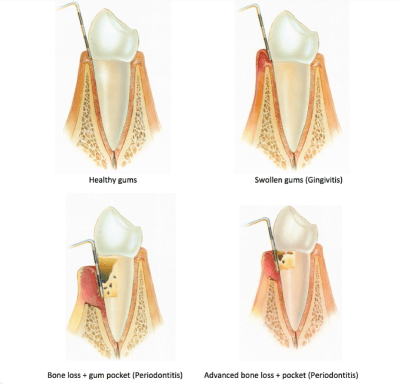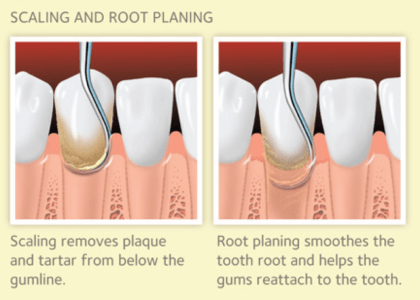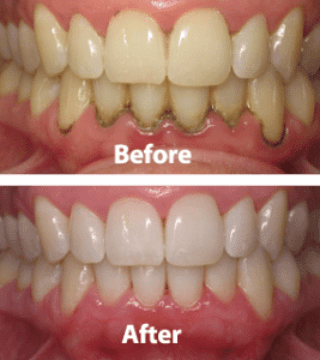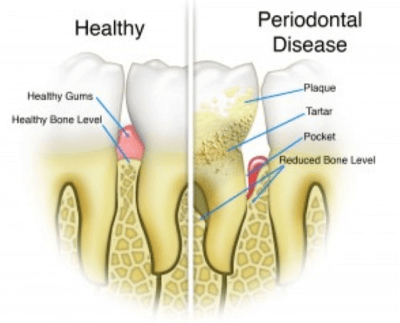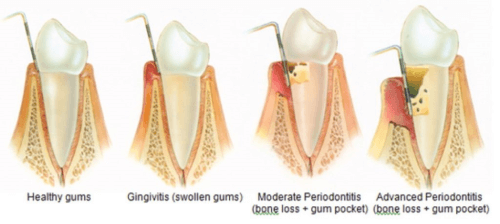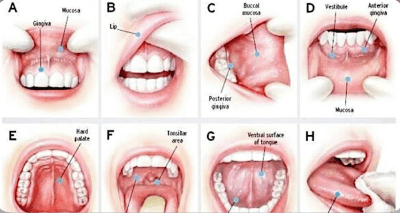Oral Spa
Oral Spa
Oral Exam
Oral Exam
Periodontal Disease
Periodontal Disease
For many patients deep cleaning is sufficient to control the disease. However, in advanced cases of periodontal disease, deep cleaning alone may not be enough to control the disease. A second phase of therapy may include gum surgery to gain access to deep areas for cleaning. In some cases, it is also possible to achieve new bone formation around the tooth (periodontal regeneration).
Periodical teeth cleanings (every 2-4 months) should be carried out throughout the course of treatment as recommended. A final assessment evaluates the result after the second phase of treatment. As soon as the condition is considered stable, the patient may go back to regular care from the dental hygienist (every 3-6 months) with periodic check-ups by the periodontist/ general dental practitioner.
Are there adverse effects of the treatment?
Your gums may be sore for 2-3 days. The reduction of the depth of the pockets is likely to show in the form of some gum shrinkage (recession/root exposure) which can vary greatly in its extent. This is inevitable in cases where the gum is very swollen. In some patients this may cause increased tooth sensitivity, however this is usually temporary and rarely lasts more than a few weeks/months. Dr.Elannan will advise you on how to reduce tooth sensitivity.
Will I be able to retain my teeth for life?
If you have undergone a complete course of periodontal treatment and keep up with good oral hygiene and hygiene appointments, you are likely to have a stable condition. If you fail to do so you are likely to have ongoing gum disease. All patients who have suffered from periodontal disease at some stage in their lives are at higher risk of experiencing an episode of gum disease again at a later stage. However, periodontal treatment followed by good home tooth cleaning and regular hygiene appointments will reduce this risk significantly.
Am I likely to suffer from gum disease?
Most people suffer from some form of gum disease, and it is a major cause of tooth loss in adults. However, the disease develops very slowly in most people and it can be slowed down to a rate that should allow you to keep most of your teeth for life.
What is the cause of gum disease?
All gum disease is caused by plaque which is a film of bacteria that forms on the surface of the teeth every day. Many of the bacteria in plaque are completely harmless but there are some that have been shown to be the main cause of gum disease. To prevent and treat gum disease, you need to make sure you remove all the plaque from your teeth every day. This is done by brushing and cleaning in between the teeth with ‘interdental’ brushes or floss.
What happens if gum disease is not treated?
Unfortunately, gum disease does not usually cause pain as it gets worse so you may not notice the damage it is doing. However, the bacteria are sometimes more active and this makes your gums sore which can lead to gum abscesses and pus may ooze from around the teeth. Over a number of years, the bone supporting the teeth can be lost and if the disease is left untreated for a long period of time, treatment can be more difficult.
How do I know if I have gum disease?
The first sign is blood on your toothbrush or in the rinsing water when you clean your teeth. Your gums may also bleed when you are eating, leaving a bad taste in your mouth and your breath may also become unpleasant.
Common Warning Signs May Include:
- Red, swollen gums
- Persistent bad breath
- Bleeding after brushing or flossing
- Pain when chewing
- Sores or pus-filled bumps in the mouth
If left untreated, tartar and bacteria not sufficiently removed may result in periodontitis (an advanced stage requiring periodontal disease treatment). As bacteria spreads, it causes the gums to pull away from the teeth, allowing the infection to invade the surrounding bone and tissues that hold the teeth in place.
What do I do if I think I have gum disease?
Visit your dental team for a thorough check-up of your teeth and gums. They will measure the ‘cuff’ of gum around each tooth to see if there is any sign that periodontal disease has started. X- rays may also be needed to see the amount of bone that has been lost. This assessment is very important so the correct treatment can be prescribed for you.
Non-Surgical Treatment Options Include
- Professional teeth cleaning
- Scaling and root planing (deep cleaning)
- Antimicrobial treatment
Mild-to-moderate cases of periodontal disease can be controlled non-surgically. Our professional dental hygienists may be able to remove hard tartar by using the latest in professional teeth cleaning equipment.
Moderate cases of infection are often treated by using a deep cleaning technique called scaling and root planing. During this periodontal treatment procedure, we use special equipment to scale away the accumulated plaque and tartar with rough spots on the tooth surface smoothed to remove all infectious bacteria.
Follow-up care at home is absolutely essential in order to maintain a healthy oral state and we may also send you home with an antimicrobial mouthwash or other antibacterial medications and prescription toothpaste.
What else may be needed?
Once your teeth are clean, your dental team may need to treat the roots of the teeth to make sure the last pockets of bacteria are removed. This is called ‘root planing’. You’ll probably need the treatment area to be numbed before anything is done. Afterward, you may feel some discomfort for up to 48 hours.
Once I have had periodontal disease, can I get it again?
There is no cure for periodontal disease but it can be controlled as long as you keep up the home care you have been taught. Any further loss of bone will be very slow and it may stop altogether. However, you must make sure you remove plaque every day and return for regular check-ups by the dental team.
“I HAVE HEARD GUM DISEASE IS LINKED WITH OTHER HEALTH CONDITIONS – IS THIS TRUE?”
In recent years gum disease has been linked with general health conditions such as diabetes, stroke, cardiovascular disease, poor pregnancy outcomes and even dementia. More research is needed to understand how these links work but there is more and more evidence that having a healthy mouth and gums can help improve your general health and reduce the costs of medical treatment.
Oral Cancer Screening
Oral Cancer Screening
Oral cancer includes any abnormal group of cells in the mouth including the gums, jawbone, lips, tongue, throat and salivary glands.




